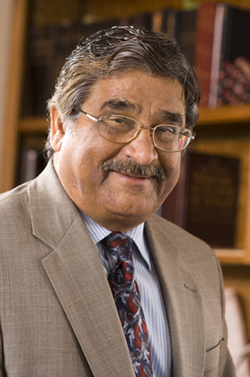
Naresh S. Dalal, the Dirac Professor of Chemistry and Biochemistry at The Florida State University, has been selected to receive the 2010 Silver Medal for Physics/Materials Science from the International Electron Paramagnetic Resonance Society. The elite award has been bestowed only six times previously, and only twice in the past seven years.
Dalal was recognized for his “three decades of pioneering research in electron paramagnetic resonance, its novel application to a wide range of problems from studies of free radicals in toxicology and carcinogenesis to ferroelectric and magnetic phase transitions in quantum solids and high-temperature superconductivity, and for developments of new techniques particularly at very high frequencies and magnetic fields.” The award will be presented at the Worldwide Magnetic Resonance Conference in Florence, Italy, in July.
With more than 1,000 members worldwide, the International Electron Paramagnetic Resonance Society seeks to stimulate scientific development of an advanced technique for chemical analysis known as electron paramagnetic resonance (EPR) or electron spin resonance (ESR) spectroscopy; facilitate communication among researchers; and encourage the use of this technique across a wide variety of research fields.
“When I started my research career, I found the area of ESR spectroscopy particularly fascinating,” Dalal said. “I never felt that I was working particularly hard over the years; it has just been a lot of fun.
“I find it surprising that my international colleagues find my work to be ‘pioneering,'” he said. “Nevertheless, I am deeply honored to be recognized in this manner.”
Much of Dalal’s research in this area has been conducted in collaboration with the Electron Magnet Resonance user program of the National High Magnetic Field Laboratory in Tallahassee.
Colleagues at Florida State say the international attention on Dalal’s work is richly deserved.
“This award recognizes an extraordinarily broad range of research accomplishments by Professor Dalal, ranging from fundamental electricity and magnetism to potentially major applications in medical imaging and solid-state devices,” said Alan G. Marshall, the Robert O. Lawton Professor of Chemistry and Biochemistry at Florida State and director of the Ion Cyclotron Resonance Program at the magnet lab. “Moreover, his career is still ‘peaking,’ and I look forward to further groundbreaking developments over the next several years.”
“Dr. Dalal showed prescient wisdom early in his career when he recognized the enormous potential of magnetic resonance techniques for uncovering a wide range of fascinating aspects of molecular and materials behavior,” said Sir Harold Kroto, the Francis Eppes Professor in Florida State’s Department of Chemistry and Biochemistry. “He embarked on a voyage of fundamental research allied with imaginative technical development, and this has led to his present position as the world-leading expert in a highly competitive and difficult branch of important research.”
(Kroto, a co-recipient of the 1996 Nobel Prize for Chemistry and Biochemistry, recently collaborated with Dalal on a landmark research project that could lay the groundwork for a new generation of high-powered computer chips and other data-storing devices. Click here to read more about that project.)
A former chairman of Florida State’s Department of Chemistry and Biochemistry, Dalal has published 390 journal articles that have been cited a remarkable 6,000 times. In 2007, Dalal was recognized as the top chemist in Florida by the Florida Section of the American Chemical Society, which bestowed upon him its annual Florida Award.
He also received the 2007 Southern Chemist Award from the Memphis Section of the American Chemical Society — an honor that recognized him as “an outstanding researcher who has brought recognition to the South.” In addition, Dalal was named a fellow of the American Physical Society in 1999, and in 2003 he was designated a Distinguished Research Professor, which recognizes outstanding research and/or creative activity, at FSU.




